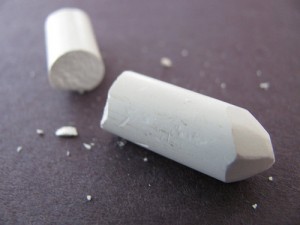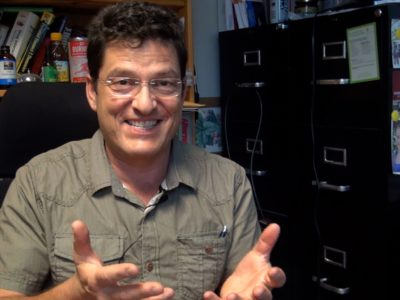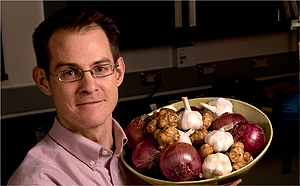Shelley’s Note: Many health experts call a calcium heart scan the best way to measure heart disease risk. Calcium buildup in the arteries means that there has been “scabbing” and damage in the arteries. That’s a bad sign, all by itself. But those kind of calcium filled, waxy plaques are prone to breaking off and causing blockages within the bloodstream that can lead to heart attacks and strokes. Recently, Sam got bad news about the levels of calcium in his arteries. In the last 5 years, the amount of calcium in his arteries has increased sixfold. Sam’s doctors want to put him on a cholesterol lowering medicine, but those caused muscle pains for Sam when he used to take them. Sam’s open to some other options. And a decade ago, he took a nutrition class from Dr. Ron Rosedale, which improved all his health markers, including his cholesterol. He’s considering going back to Ron Rosedale’s low-carb, high fat diet. Now let’s listen in, as Sam talks with Ron Rosedale.
SAM: Hi, Dr. Rosedale, it’s good to talk with you again.
Dr. Ron Rosedale: Hi, nice to talk with you again, Sam.
TROUBLE – Sam’s arteries have more calcium plaque
Sam: I’ll just start in, then. What precipitated this was, I had a heart scan two or three weeks ago. This was a follow-up to a scan I had had four years prior. My doctor said, “It’s been four years,” and he recommended another one.” That scan showed significantly increased plaque and calcification build-up. I don’t know if you’re familiar with the numerical scale they use? They had me in late 2008 as a 3 on that scale, and now, in early 2013, I had gone to an 18. Still relatively low on what I think is a 100-point scale—
Ron: It’s the number of pixels that light up. I’ve seen numbers in the thousands.
Sam: On one hand, the percentage is a six-fold increase, and that was the concern. On the other hand, it’s not that high. I’m 49 years old.
Sam: My “nutrition” bar? Ron Rosedale: It’s a candy bar.
Sam: I do mild exercise most every day, and my diet fluctuates. The—
Ron: Wait, wait! Don’t skip over that.
Sam: [laughs] OK, I understand!
Ron: If you don’t mind, very briefly, when you say your diet fluctuates, can you elaborate?
Sam: I tend to start my day with some almond butter or cottage cheese, to get myself a little protein. It’s usually one of those two things. I might skip lunch, I might just have some kind of nutrition bar, or I might have a sandwich.
Ron: When you say “nutrition bar”—?
Sam: [laughs] Well, I guess—
Ron: Is that just another term for candy bar?
Sam: Some might say. It’s not a Snickers, it’s something I might get at Whole Foods that’s promoted as protein and nutrition, although it tastes pretty sweet. It might be Odwalla, another company. It’s probably somewhere between a full-on candy bar and something moderately healthy. I don’t know. I might have one of those in the middle of the day, and then I’m very hungry when I get home at night and tend to overeat. I’ll eat—I like to butter anything I can butter, and that’s the time when I tend to eat refined carbs, that might be a bowl of cereal, a bagel, peanut butter or almond butter and jelly sandwich. I know I don’t eat as much fruits and vegetables as I should. I tend to be able to get a couple carrots in me every day, just because that’s easy.
Ron: Is that supposed to be good?
Sam: I think carrots are somewhere in the middle of good. I know they’re sweet, and that may be a problem. I think of them as being pretty good. I’m drinking a little every day, not to excess, but I’ll typically have a glass of red wine or two or a glass of whiskey or two. That’s a typical day for me.
Ron: And has that been typical since you’ve had your last ultrafast CAT scan?
Sam: Yeah, I think that’s pretty typical. I was better before that first scan. I don’t know if you remember, but I did a pilot group with you several years ago that Shelley had set up. I lost a considerable amount of weight and tried to stick to the recommended diet and was pretty successful for a while, but gradually dropped away from that, not for any particular reason I can think of, other than, it just fell away.
Ron: Society. [laughs ironically]
Sam: It’s been hard to stick to it. So yeah, I would say that the diet I just described has been more or less similar for the four years since the first scan.
Should Sam give up his beloved butter? Ron Rosedale: Keep the butter!
Shelley Schlender: And if I can add one thing, it’s that when Sam went to get his heart scan, he said that he is so afraid that his heart scan means he will have to give up butter.
Sam: It is my favorite thing.
Ron: Well, then, let me absolutely alleviate your fears! It’s not butter that you have to fear. You don’t have to give up your beloved butter. Actually, as we speak, on my kitchen counter right now, I have an open stick of butter on a plate that I periodically take a pat of and just stick it in my mouth, just because I love butter. Not on anything else, I take maybe a half a teaspoon of butter and just eat it.
Sam: That’s GREAT!
Ron: And there’s no problem with that. So this isn’t going to be as horrible as you think!
Sam: Good.
Ron: But some of the other things that you’re eating are extremely detrimental, and I will tell you why and how they are very, very relevant to your heart scan. It’s, I’m sure, quite different than what is normally being proposed and promoted to deal with increased arterial calcification.
Statin drugs & muscle cramps? Ron Rosedale: Muscle DAMAGE.
Sam: I can tell you one thing before you comment on that. They did recommend statins.
Ron: Of course they did! If you stub your toe they’ll recommend statins.
Sam: And I’ve resisted that.
Ron: Good?
Shelley: Sam, you said that you actually had muscle pains when you took statins once before.
Sam: I did. My primary care doctor, who I really feel we have a good relationship and I appreciate the care, but that was one point where we disagreed. I did finally break down, he was recommending statins because my bad cholesterol had gotten over 200 and stayed there, and after resisting it for a few years, I finally did say, “OK, I’ll try it.” I was on a low dose of Lipitor, and I did have some muscle cramping. It seemed to lessen or go away after a few days—
Ron: Can I interject? Why are you calling is muscle cramping?
Sam: It felt like a tightness. Maybe it’s not an accurate description. It felt like the muscles were sore.
Ron: That’s correct. Muscles are sore, no doubt about it. I’m sure they were achy. You wouldn’t say it was necessarily a cramp. Have you ever had a cramp in your calf before?
Sam: Yeah, you’re right. It wasn’t like that. That would not be an accurate description. So I just stopped taking them. He said, “OK, if you don’t want to take them.” The blood work that we did right after I stopped taking the statins did show that that cholesterol number had dropped. I had just said I wouldn’t take them any more, and I haven’t, until I did this new heart scan, and even before I’ve met with my own doctor, the people who did the scan have recommended statins. They also talked about a water-soluble type of statin that they felt might be more appropriate or might avoid the muscle soreness that I had had from the Lipitor which I presume is non-soluble, a different kind. [sound of Ron sighing] You’re sighing!
Ron: I am just dying inside hearing this story! It’s such—I don’t know even how to describe it. There’s no science to back up anything they say about statins. In fact, the science will almost absolutely refute what they say.
Sam: But the statin does lower the—
Ron: Yes, it lowers the cholesterol number. It does. Does it lower mortality rate? Will it reduce your risk of dying?
Sam: I don’t know.
Ron: It won’t. In fact, it’ll increase it. You said your muscles ached. You called it a cramp. Did they tell you why statins do that?
Sam: They may have, but I don’t remember.
Ron: They probably didn’t. I will tell you. It’s not a side effect, it’s a secondary effect—actually, it’s a primary effect of statin drugs, not even a secondary, not even a side effect. The primary effect of statin drugs like Lipitor is to reduce an enzyme called HMG coenzyme A reductase. That’s what it does. They’re known as HMG coenzyme A reductase inhibitors. When statins were first developed, that’s what they were developed for. They were specific developed in a laboratory to inhibit that enzyme. That is what they do. It’s important to recognize that. They were not developed as antioxidants, for instance, or anything like that. They were specifically developed to inhibit HMG coenzyme A reductase, which is an enzyme that manufactures cholesterol in the liver. It’s one of the steps. When you inhibit the enzyme, you reduce the manufacture of cholesterol in the liver.
Ron: That same enzyme, as is very typical in biology, is not used for just one purpose, however. It’s used for multiple process. One of the other purposes of HMG coenzyme A reductase is to manufacture something called coenzyme Q10, which is involved in the so-called mitochondrial respiratory chain. Co-Q10 is very critical in transferring energy from food into usable little batteries within the mitochondria of our cells – batteries that all of life uses called ATP. When you diminish coenzyme Q10, you diminish the ability of all your cells to produce energy. That’s really, really important, because without energy, you have no life. The reason you were developing muscle cramps is because your muscles use energy. You called it cramps. It was really aching. That’s because whenever you use a muscle, it has to rebuild itself. It can’t rebuild itself fast enough if it doesn’t have enough energy to do so.
Ron: It’s interesting that “experts” that recommend statins don’t connect the fact that your heart is a muscle. You were not, unbeknownst to you, just having a problem with your skeletal muscles. You were having a problem with your heart, too, when you took statin drugs. It wasn’t able to pump as hard, to constrict as hard. In other words, it was weaker because you took statin drugs than if you didn’t. The purpose of your heart is to pump blood. Under the misguided—if you want to call it that, and I’m being polite in saying that—attempt to reduce risk of future coronary heart disease, people who prescribe statins give you heart disease. It is an effect of statin drugs to reduce energy production, especially in muscle tissues, in other words, the tissues that use a lot of energy will be the ones most adversely affected by the inability to produce enough energy. And the heart is one of the major tissues, heart muscle, one of the major organs that requires lots of energy. It is adversely affected.
Ron: Not only that, but because, perhaps, and this is somewhat speculation, it is known that when you reduce cholesterol, you increase risk of death. Not necessarily cardiovascular death, and that’s the kicker. What they try to tell you is that taking cholesterol-lowering medications reduces risk of cardiovascular disease. That may or may not be true. There’s a lot of twisting of data to come up with that. But what they fail to tell you is that despite—perhaps—reducing cardiovascular deaths, taking statins increases total mortality. Perhaps you won’t die of heart disease, but you’ll die of something else.
Sam: Is there research?
Ron: There’s been research since the 1970s that has shown, over and over and over again. It’s not news.
Sam: As a lay person, I’m thinking, the mortality rate has been linked to the statin use, but they’ve been able to isolate other risk factors and say that statins increase your chance of dying of something?
Lower cholesterol? More death overall
Ron: Most of the data indicating dangers from statins is not done on statins particularly, because the people who are doing research on statins are the drug companies. You’re not going to find an independent person spending upwards of $50 million or $100 to do a big study on a statin drug to show a negative effect. That’s a major problem in medicine. You don’t spend money to show a negative effect. You spend money to make money. Pharmaceutical companies will spend a lot of money to do a study, not to find an ultimate truth that would better your health or even care about your health, but to look after their financial interests and the financial interests of their stakeholders, to which they are beholden.
Shelley: I think that if a drug company person is listening right now, you might be hurting their feelings.
Ron: Well, good! I hope so! In fact, if I could hurt them even more, I would. It’s really unfortunate. But a lot of data can be gathered without having to spend $50 million or $100 million, and this other data shows that if you just check cholesterol levels, and lower your cholesterol level, below somewhere in the neighborhood of 250, your risk of dying accelerates. And in fact, your risk of dying with low cholesterol is considerably more than your risk of dying with cholesterol above 250. It’s kind of a U-shape. That’s been known a long time. The lowest risk of mortality is with a cholesterol of roughly 250. That was shown in the seven-country study in Europe, and there have been so many studies that have shown that, but it’s not something that a drug rep is going to go into a doctor’s office and be paid by a drug company to tell doctors.
Sam – But MY doctor CARES about me! Ron Rosedale – Doctors are gullible.
Sam: But doctor aren’t stupid, right? My doctor is not stupid, and he cares about me!
Ron: I’m sure he cares about you, but I don’t know if he’s stupid or not. I don’t know him. Medical doctors certainly not much smarter on these issues than the average population. So I can’t speak directly about your doctor. But as a group, medical doctors are very gullible, and that I know. Has he read the underlying research? Probably not. Ask him why not? Does he know what HMG coenzyme A reductase does? Does he know its correlation with coenzyme Q10?
Ron Rosedale – Statin drugs hurt the heart’s power to pump
Does he know that statin drugs reduce the ejection fraction of the heart?
Sam: I don’t know what that is.
Ron: Ejection fraction is a measure of how strongly your heart beats, how much blood it pumps out. The actual ejection fraction is a percentage of the blood that goes out with each beat versus the blood that goes into the heart. If your heart were 100% with each beat, it would pump every drop of blood out that came in. That doesn’t happen. Nobody’s got that. So if you’re a good athlete at rest, your ejection fraction might be 75%.
Sam: Is that something that’s measured?
Ron: Yes, it can be measured, absolutely. I’ve done it on my patients and just by taking people off of cholesterol-lowering drugs, I’ve saved numerous surgeries, because I look at ejection fraction and say, “That’s not so good.” I’ve saved people from heart transplants, because they had ejection fractions really low. Lo and behold, you take them off statin drugs and their ejection fraction goes up at least 10 points.
Sam: Are you one of the few doctors who measures that?
Ron: Ejection fraction is measured quite consistently by cardiologists. It’s a simple measure. You can get a good measure of ejection fraction just by doing an echocardiogram, where you bounce sound waves. An echocardiogram is a nice, non-invasive test.
Sam: Yeah, I think I had that done. They made me go on a treadmill with a sensor on my chest. That’s some years ago I had one of those.
Ron: That was just a stress test. That was not an echo stress test. That was just a typical stress test where they do an EKG. That will not measure ejection fraction. However, they could have measured ejection fraction, and you can do a stress echo that will measure ejection fraction. Anyway, it’s not hard to measure, and it’s been measured for a long time. It is known that the statin drugs will impair ejection fraction, probably through its inhibition of the manufacture of coenzyme Q10.
Sam: Water soluble statins? Ron Rosedale: They’re bad, too.
Sam: Can I ask you about the other kind of statin? This place this did the scan said there’s water-soluble statins that might not lead to the muscle soreness I had with the Lipitor version. Is that any better?
Ron: It’s no better. I haven’t really looked into the research as to why they feel it would reduce pain or if it would even reduce the inhibition, for instance, of coenzyme Q10 manufacture. It’ll still do the same thing, whether it be water-soluble or fat-soluble. If it’s a statin drug, it’ll inhibit HMG coenzyme A reductase. To tell you the truth, I’m not an expert on the water-soluble that they have just come out with. It wouldn’t really matter to me. Cholesterol-lowering drugs, with the exception of extreme cases in which cholesterol levels might be in the 600s, 700s, should not be used, period, in anybody. Fat is not your enemy. Fat does not cause heart disease. Statin drugs will not do anything to reverse vascular calcifications.
Ron: I was involved in some of the early studies on using statin drugs for arterial calcification, and they don’t work. So why they’re recommended to try to reduce your vascular calcifications is beyond me. There’s no science to even indicate that cholesterol is involved in that.
Ron Rosedale: High leptin levels promote calcium plaque in arteries
Ron: Heart Disease, however, there’s lots of science to show that other hormones are very much involved that do involve your diet. The problem is, there are no drugs to control it. Mainly that’s leptin. It’s now been known since at least 2002, and perhaps earlier, that leptin is very, very much not only involved in arterial calcification, but perhaps even might control it. But there’s no drugs to control leptin, and if there are no drugs to control something, in other words, if there’s no money to be made, they do not care about it. People can be dying. They won’t care if there’s no money to be made.
Sam: So leptin is another enzyme? I don’t know what leptin is.
Ron: Oh, no! You forgot from our group.
Sam: I did. It’s been a long time, and I’m sorry I was a bad student. But I have to say, it really did help me, particularly at the time. I lost a lot of weight and I’ve kept most of it off, and it did improve my diet, even though I backslid. I don’t want you to think I was a complete goof-off.
Ron: No, I don’t think that at all. I was just having fun with you.
Sam: But I forgot what leptin is.
Ron: The whole diet is based on controlling and lowering leptin levels.
Sam: You’re encouraging foods that have more leptin?
Ron: No, no. Leptin is a hormone akin to insulin that is regulated in large part by what you eat. It is produced by fat, although it can be produced by other tissues also, not the least of which is the endothelium – such as the inner lining of your blood vessels, macrophages – which are part of your immune system, and some cells of the immune system. Leptin is the major way that your body speaks to the brain to tell your brain how much energy is available within your body, and what to do with it. That’s a brief summation of what leptin does, and leptin is extremely critical. It talks with the brain by signaling the hypothalamus, which is a sort of information switching center within the brain. Leptin essentially controls virtually all aspects of the hypothalamus in your brain. The hypothalamus is a very, very ancient, perhaps the most ancient part of your brain that takes in information from many sources, from the nervous system, from lots of different hormones, and then regulates all of the process that are critical to life. It sends out hormones and nerve impulses to control the thyroid and the ovaries and the pituitary and the adrenal gland. Leptin controls reproduction.
Ron: In this case we’ll concentrate on leptin’s role in cardiovascular physiology. Leptin, through the hypothalamus, we know, helps control the sympathetic nervous system, which is very relevant in that it helps dictate the narrowing and widening of arteries. Arteries are not just static. This mental picture that medicine paints to delude people into thinking that your arteries are like copper pipes in the kitchen and if you eat fat they will plug up and you’ll die of a heart attack could not be further from the truth. It doesn’t occur that way. Your arteries can dilate and constrict, and the dilatation and constriction largely determine your circulation, over and above if you have blockages. And the dilatation and constriction are determined by certain hormones, but also very much by the sympathetic nervous system, which is controlled through the hypothalamus by other hormones, not the least of which, again, is leptin.
High leptin levels increase inflammation
Ron: Leptin also controls the immune system via influencing on macrophages and white blood cells. Leptin itself is a type of hormone called a cytokine, which is very pro-inflammatory. We know when leptin goes up, your system is very much in a pro-inflammatory state. And we know that cardiovascular disease is a disease of inflammation, where the lining becomes inflamed and therefore swells, and you get plaque as a result of that inflammation. Inflammation is there to help heal, but if it’s overdone and goes on too long, it can cause death also. For instance, if you cut your hand, the wound will swell. There are signals that will be sent out from having cut your hand that will cause blood vessels to constrict so you don’t bleed to death, will cause white blood cells to come into the area to clean up debris and to guard against invasion by microorganisms, to give you infection. The beneficial side of inflammation makes all this happen, and it causes cells that line the cut to grow, to multiply, so it can heal. And ultimately, that cut will heal, and you think nothing of it. If that process initiated by inflammation hadn’t occurred, you would have died from a small cut to your hand. But if inflammation continues, long after that wound has healed, it can start to cause many other problems within the body, and in fact it can damage body tissues throughout the body. Leptin plays a role in all this inflammation.
Anyone can measure leptin levels in the blood
Sam: How can I know if I’ve got the right level of leptin?
Ron: You can measure it, just as easily as you can measure cholesterol, and about just as cheaply.
(NOTE FROM SHELLEY) – As of this posting, a fasting serum leptin test can be ordered on line for $99 from Direct Labs, $69 from Walk-in Labs, $159 from AccesaLabs
Ron: Have you had your leptin level measured?
Sam: I don’t think so.
Ron: I don’t think so, either. And that to me is an absolute sin and really should be malpractice, because high leptin is why you’ve got cardiovascular calcification, and they don’t even measure it. Why? Because there are no drugs to control it. It’s been known for 10 years now, and there’s probably hundreds of articles that show the control of leptin on cardiovascular calcification. If you take the lining of your artery, the endothelium, and even just expose it to leptin, it will classify. If you over-expose it, I should say. There are cells that line your arteries that are—I wouldn’t even say relatives, virtually brothers of bone cells. There are osteoblasts. They’re basically osteoblastic progenitor cells.
Shelley: That’s the stuff that builds bones, osteoblasts? You’re saying it’s the same kind of things in our arteries?
Ron: Right. They’re in a kind of precursor state. They’re not bone. But they can turn into bone. Some of our ancient evolution somehow in development, the same progenitor cells that make bone also make arteries.
Sam: So next time I go to my doctor and he gives me the sheet to take to the lab and he ticks off the different things the lab is supposed to look for, could he just be ticking off leptin as well?
Ron: Yes, he could. It’s a test that’s being done by every major lab in the world. But it’s not being tested because there are no drugs to control it. And I guarantee if there were, they would recommend leptin-reducing drugs for everybody.
Ron: You can lower leptin levels with a low-carb diet
Sam: Doctors say lowering stress works better than changing diet
Ron: Eating more sugar produces stress; eating lower carb reduces stress
Sam: How do you recommend I control it? We’re getting back to diet, I assume.
Ron: It’s the only way.
Shelley: Before you get into that, when we were at the calcium scan place and they were explaining what things make a difference, the data that they have say that diet and exercise make almost no difference, that the only lifestyle that makes a difference is whether you feel stressed. So forget about worrying about your diet, forget about exercising, and just work on stress.
Sam: That’s true. They did say that.
Ron: Mm-hmm. First of all, when you talk about stress, what are they really talking about? Are they talking about cortisol? One of the biggest stresses to the body is when glucose levels go up. That essentially mimics the fight-or-flight response. When you get scared in our evolutionary history, all of a sudden you’re attacked by a lion or a bear or a saber-toothed tiger, you’ll do things that previously perhaps were super-human. Your body gets prepared almost immediately for either fighting or flighting, i.e., running. You’ll run fast, and that’s because your body goes through a number of different mechanisms that will help you be successful in those two endeavors, one of which is to constrict certain blood vessels and dilate others. It does this through the sympathetic nervous system. You have adrenalin that gets pumped into your system, again through the sympathetic nervous system that is controlled by the hypothalamus that is controlled by leptin.
Ron: One of the events that occurs in this fight-or-flight response is to increase glucose, meaning sugar, in the blood. The reason for that is because you can burn glucose without oxygen. Glucose can serve as an anaerobic fuel. That’s the major reason we have glucose at all. It’s a reserve fuel supply for anaerobic emergencies, for very stressful, high-exertion activities where you cannot breathe fast enough to supply enough oxygen to burn fat,. Burning fat requires oxygen, and burning sugar does not.
Sam: I thought it was adrenalin that helped with all of that.
Ron: It is. Adrenalin is one of the hormones that goes up in fight or flight.
Sam: To get that extra burst of energy in a fight-or-flight situation, it’s adrenalin that starts pumping.
Ron: I mentioned adrenalin. The adrenalin is put out by the sympathetic nervous system. It originates from the hypothalamus, and one of the events that occurs when adrenalin and other hormones are pumped out and the sympathetic nervous system is stimulated like that, is the body on its own puts more glucose in the blood, either from reserves it keeps or by burning the body’s own muscles to make sugars for the blood. A high glucose, then, is put there for an emergency fuel supply, because it can be burned without your having to breathe beyond your capacity in supplying oxygen. You can burn, you can get energy from glucose, even though you’re not able to breathe fast enough to be able to burn fat. But conversely, if you eat foods that raise your blood sugar levels, it’s interpreted by the body’s communication systems as a sign of stress.
Sam: Glucose is like having stress?
Ron: That’s exactly right. When you have high levels of glucose in the blood, we also know that the sympathetic nervous system is stimulated, both through increasing insulin levels and through rising leptin. Basically, it’s a reverse process – higher blood sugar becomes a sign to your body that you’ve got stress around. When you have high levels of glucose, we know that it causes stimulation of the cells in the pancreas to put out insulin. What’s less appreciated is that there is also a stimulus to put up higher levels of leptin. Both of these things cause an increase in the sympathetic nervous system response, which is the stress response that causes vasoconstriction – meaning narrowed blood vessels. The stress response to increasing blood sugar levels constricts blood vessels, especially in muscles and skin, so that if you cut yourself during the fight, you won’t bleed to death. It causes chemicals to be released into the blood so that it will clot faster. Well, that’s great if you’re fighting a saber-toothed tiger, to have vasoconstriction and your blood clotting more, and not so great if you’re trying to prevent heart attacks.
Sam: So I could do all manner of things, yoga, meditation, exercise, to reduce stress, but if I have a diet that has a lot of sugars, that’ll be just as bad or worse?
Ron: That’s correct. As far as you’re concerned, as far as your vascular physiology and calcification, and we could talk for weeks, maybe months, on the cardiovascular physiology of insulin and leptin, but let’s just talk about the calcification.
Ron Rosedale: Cholesterol is not the Darth Vader of health
Ron: Cholesterol-lowering drugs have never had anything to do with calcification. Cholesterol has very little to do with calcification. It actually has very little to do with the causation of coronary artery disease, even, or plaque formation. It’s a correlation that they twist around into a cause. Yes, cholesterol is correlated with heart disease, it’s correlated with atherosclerosis. They’ve never been able to show a causation. In no science. You’ll never see this in physics, where they confuse so often correlation with cause. They leave that up to their publicity department to spin a study that shows a correlation between cholesterol and cardiovascular disease into a causation. In other words, a study will show that there’s even a weak correlation between a cholesterol particle and cardiovascular disease, and then they’ll tell their PR department to publicize it. They’ll say, “There was a 2% reduction in second heart attacks in people who took statin-lowering drugs. If you translated this to the world’s population, we would save 100,000 yearly.”
Ron: One does not follow the other. Correlation does not imply cause. Firemen are correlated with house fires. Rarely is it the firemen who cause it. Occasionally, maybe, but I would certainly not want to kill the firemen as a means to put out the fire. And that’s what they’re doing with cholesterol. Your doctor, who I’m sure means well, have him sit down and put on his thinking cap for a little while. Why is the liver making cholesterol? They talk about good and bad cholesterol. Have him think about that. What is “good” and “bad” cholesterol? Is there such a thing? The answer will be no. Cholesterol is a single molecule. They look at HDL and LDL, which is called good and bad cholesterol. What does LDL stand for, what they call “bad” cholesterol? It’s low-density lipoprotein. It’s not cholesterol. LDL is not cholesterol. It’s a protein that shuttles cholesterol, because cholesterol is a fatty molecule, a waxy, fatty substance. It’s not going to dissolve in the watery environment of the blood. It has to be attached to a protein to make it water-soluble so it can be transported.
Ron: Why is your body going to such pains to first make sure that it manufactures cholesterol in the liver and create proteins to transport it? So that it can give you cardiovascular disease and kill you? Evolution doesn’t work that way! Why did this evolve in the first place? I will tell you, at least briefly, because cholesterol has many purposes. One of the main purposes is that you can’t have life without it. It’s one of the few substances we know that is required by every cellular life. You can’t make a cell without cholesterol. Far from the myth of it being the Darth Vader of health that the pharmaceutical industry has been very successful in perpetuating, it’s one of your primary saviors. You could not live without cholesterol. A bacteria could not live without it. Nothing can live without cholesterol. You liver makes it because you are constantly killing cells and you need cholesterol to rebuild them.
Sam: How about eggs? Ron Rosedale: Please. Let’s look at eggs.
Sam: So can I be eating that stuff that’s supposed to be full of “bad” cholesterol, like eggs?
Ron: Please. Let’s look at eggs.
Sam: I like eggs, by the way.
Ron: What is an egg?
Sam: It’s two portions, the yolk and the white. It comes from some kind of fowl.
Ron: Let’s go more basically than that. Not the composition, but what is an egg? An egg is the beginning of all animal life. It’s where animal life comes from. Has that egg evolved into what it is today?
Sam: I imagine so?
Ron: It had to.
Sam: And it’s delicious.
Ron: Evolution has evolved in an egg. All of those nutrients that will allow that egg to most successfully turn into life and give that life a good running start to be successful and make it in this world, the nutrients in an egg were hand-picked by evolution to be those that are most vital to life. Not death, but most vital to life. That’s how evolution works.
Sam: It sounds like an egg is a really nutritious food, then.
Ron: Yes! Yes! You are now smarter than 99% of the medical population. An egg is a really nutritious food. It is perhaps the most nutritious food that there is. It has gotten the gold star from evolution, and to be the most nutritious food that life can have to initiate life and sustain life in its early stages, what food has the most cholesterol? An egg, yeah! What does that tell you?
Sam: I’m having a disconnect between what we’re talking about and the recommendation to strictly limit your egg consumption.
Ron: Let’s say who to believe. Despite all this great medical advice that we’ve had, where are we headed as far as cardiovascular disease? Cancer, mortality, the rate of aging? Despite that country spending 10 times more on medical care than any other country, where do we rank as far as health?
Sam: I think we’re somewhere in the middle of the pack for developed nations.
Ron: I think we’re 38th or something.
Sam: Pretty low, then.
Ron: Yeah. Despite spending 10 times more than everybody else. That’s telling you one of two things: we’re not getting a whole lot of bang for our buck, or it could be telling you something else—that we are getting bang for our buck, we’re just going in the wrong direction. In other words, it could be that the medical care is not just not doing enough in this country, it could be that it is doing something: that it’s killing people.
Sam: Bagels without butter?
Ron Rosedale: Go for butter without bagels!
Shelley: When we had a conversation with some doctors here in the Boulder area, one was a cardiologist who actually was very open to higher-fat lower-carb diets and paleo kinds of diets. He said these alternative diets are actually very beneficial for some people, and he observed that the kinds of medications that he can offer people are there waiting for if they don’t want to change their lifestyle, and most people don’t. It was interesting talking with him and with the other local doctors, because one of the things they were debating was things like saturated fat versus vegetable oils. Sam has had some questions about that. If he’s having a bagel, should he put butter on it or a vegetable oil spread that doesn’t have so much saturated fat on it?
Sam: I think he’s going to say, “Don’t eat the bagel.”
Ron: That’s exactly what I’m going to say.
Sam: [laughs] OK! So I’ve learned a little bit!
Ron: The bagel will adversely affect the physiology of the fat. When you eat the bagel, it’ll turn into sugar. We call it a bagel. Our cells will see it as sugar. When we put it in our mouth, all we’ll d is chop it into smaller pieces. When we digest it, we’ll chop it into even smaller molecular pieces. All your cell ends up seeing is glucose, for the most part. The glucose will also very much raise insulin. It will raise leptin. Ultimately that will cause leptin and insulin resistance, but more immediately, it’ll prevent you from burning fat. So when you eat that bagel and you cause a big rise in glucose, which will glycate and cause all sorts of molecular damage, all sorts of DNA damage, all sorts of nasty things just from the glucose itself, but the fact that it raises insulin is a signal to your body to burn the sugar and not the fat. You can’t burn fat when the insulin is high. So when you put the butter and the bagel together, it’s quite different than if you were to eat the butter or the bagel separately. Eating them together, what happens then is that you will essentially digest the bagel and the glucose, you’ll end up going into glucose-burning mode, you’ll burn the glucose for energy, which as a story for another day, will cause more damage than if you burn fat, but because you ate the bagel, and you’re body’s tuned to burning sugar, it won’t burn the butter for energy. It will store the butter as fat.
Ron: People get fat not because they eat the fat, but because they can’t burn the fat. It’s a one-way valve. What causes that one-way valve is, initially, elevations in insulin and later on disruptions in insulin and leptin signaling, so your brain doesn’t even know how much fat you’ve got. The default becomes to store fat. So you could be 200 pounds overweight, you could have all sorts of extra fat that would be very detrimental to your life, but ultimately what happens is that there’s a disregulation in the signals that tell your brain that you’ve got this much fat, and your brain doesn’t have any idea. It thinks you’ll be too skinny to survive a famine, and it’ll continue to have you be hungry, eat more, and store more fat until it finally gets the signal from leptin that you’ve got too much fat and you’d better burn some off or you’re going to be in trouble.
Ron: Under the question, then, which fat to eat, if you had to eat one or the other, which was the second half of your question, the saturated fats are among the least problematic. They don’t oxidize as much. You hear about antioxidants, people take antioxidants. Oxidation is a player. It’s far less important than it’s given credit for as far as causing aging and age-related disease. And we need oxidation, breathing is oxidation, so it’s not whether you have oxidation or you don’t. Like everything it needs to be orchestrated. Where, when, and how it’s used will determine health and life and death.
Ron: The saturated fats don’t oxidize as much. That’s good and bad. It’s good in that is causes less lipid peroxidation, it causes less damage in some membranes. It’s not so good in that it’s a little bit harder to burn because it doesn’t oxidize as readily. However, you can change that by going into a physiology of burning fat more continuously, and then your body gets good at burning fat, and then it burns saturated fat, and then the type of fat you eat becomes less relevant because you’ll just burn it.
Ron: All that being said, if you’re not really good at burning fat, eating omega-6 fatty acids, which are high in widely used vegetable oils, such as corn oil and soy oil, will be more detrimental to your health by fat than eating saturated fats, as far as causing cardiovascular disease and other diseases of aging itself. The omega-6 fatty acids are far more detrimental. So the institutional public policy of banning full-fat butter and instead using high Omega-6, poly-unsaturated margarines, which is what we’ve been told to do since the 1950s, has very much adversely affected our health. Data recovered from decades ago are finally coming around to show that. In other words, almost every health recommendation given for long-term health—take calcium for strong bones, eat a low-fat diet, take statins to lower cholesterol, cholesterol is the prime cause of heart disease—all of these things couldn’t be further from the truth. In fact, they’re opposite the truth. You would do far better just to run the other way.
Ron Rosedale: High leptin levels make “bone” in your arteries
Ron: When you’re told to take a statin drug, to lower cholesterol, to lower cardiovascular risk and to lower calcification in your arteries, that is scientifically nonsensical, number one, and number two will actually promote the diseases that they’re espousing it’ll reduce. It isn’t cholesterol that causes calcification at all. It is leptin at the very least. If you put endothelial cells, the inner lining of your arteries, in a Petri dish and expose them to leptin, they will build bone. We know the connection between leptin and bone. It was published in the journal Science, one of the most respected scientific journals in the world. There were several articles in 2002 that showed a very powerful connection between leptin osteoblastic activity and osteoporosis, and building bone, which surprised everybody. They didn’t know why. It really showed the connection between leptin and the sympathetic nervous system, which sends signals to bone to stimulate osteoblastic activity.
Ron Rosedale: Drugs for bones make brittle bones
Ron: A very quick run-down. Bone has both bone-building cells, called osteoblasts, and osteoclastic activity. That’s very interesting. Osteoclastic cells are those cells that tear down bone, on purpose, because your body wants you to remodel bone. All bones end up with little tiny cracks and fractures, because they undergo damage, just like all of us do on a day-to-day basis. The damage has to constantly be repaired. Life is a constant battle between damage and repair of damage. If we could repair damage as fast as if occurred, we could live forever. Our bones know this. Nature knows this. So it was very wise of Nature to give us osteoclasts to break down and remodel old bone so that we can make newer, healthier, remodeled bone. The reason I bring this up is because all of the medical therapies thus far for osteoporosis inhibit osteoclastic activity. Currently, medical therapies focus on increasing bone mass but not bone quality. In fact, the medical protocol of using drugs that inhibit osteoclasts reduces bone quality. You need the osteoclasts to be able to get rid of the old bone so you can put newer, fresher, stronger bone.
Ron: What you’ll see, again, with osteoporosis therapy today is treating a number. If you undergo tests to measure osteoporosis, bone scans, you’ll see yes, the thickness and density of the bones improved. But if you’ve undergone this therapy, if you fracture a bone, and you’re just as likely to even though it’s thicker, your bone will shatter like glass if you’ve been on today’s drug therapies for osteoporosis. You can ask any radiologist. Because current drug therapies have not been able to remodel, to built more protein in the underlying structure that makes up your bone, and that’s too bad because it’s the protein structure that allows that bone to be more flexible, which is what really confers the strength. In current treatments for thinning bones, it’s just a number we’re treating, not the underlying cause, which is poor signaling information to the body about how to build enough protein into the bone’s inner layers, and how to balance osteoclast and osteoblast activity. I mention this again because whenyour doctors are talking about heart health, they’re focusing on a number – they’re talking about LDL cholesterol. Even when they’re talking about diabetes, they’re giving a number for the level of sugar in the blood, the glucose, and diabetes is not even a disease of glucose, it’s a disease of hormonal signaling that’s either being helpful or confused about what it’s telling glucose to do. For instance, if you lower glucose by raising insulin your insulin levels, you are substituting one evil for an even worse evil.
Ron Rosedale: More drugs to lower blood sugar in diabetics can lead to more deaths
Ron: That was shown by the ACCORD [Action to Control Cardiovascular Risk in Diabetes] study, where everybody’s still scratching their heads about what went wrong. That study showed that the more doctors controlled their patients’ blood sugars with blood sugar lowering medications, when they threw more drugs on these patients to lower their blood sugar levels, there was a very significant increase of death. Note that this study did NOT compare a typical medical doctor’s dietary recommendations to having diabetics adopt a low-carb, high fat diet. That’s been shown in many studies to be safe to do. The ACCORD study simply showed that aggressively lowering blood sugar with medications does more harm than good. And that’s as far as that study even cared to look.
 Sam: What about peanut butter and jelly? Late at night?
Sam: What about peanut butter and jelly? Late at night?
Sam: That is a lot of information to think about. I’m grateful for your time. I wanted to be sure to ask you the other part of my diet that I’ve always been concerned about is my tendency to eat late at night. How late at night can I eat that peanut butter and jelly sandwich? I probably shouldn’t even be eating that.
Ron: Let’s look at that. The sandwich itself, you’re talking bread. That turns into sugar. The peanut butter has aflatoxins, which will cause cancer. And the jelly, of course, has fructose and other sugars which have all sorts of adverse effects. It wouldn’t be a peanut butter or jelly sandwich I would eat.
Sam: OK, so no time of day or night should I be eating that. Let’s say I’m eating something like an egg or something recommended. Should I be eating that late at night?
Ron: You can, actually. But it certainly should not be your biggest meal. The reason for this is because your digestive system is a big part of you, and it needs to sleep, too. And you will not sleep completely if you’re having to digest food. It’ll take five hours or so to digest food. I tell people to not eat for at least three hours prior to bedtime. You definitely should not eat your biggest meal at the end of the day. It probably should be in the middle of the day. If you were to eat a big meal at all. There’s really no reason to. Ideally we would just kind of snack whenever we were hungry, although we have to snack on the right foods, not cookies, and just don’t eat if you’re not hungry. Having a society where the family gets together for dinner because that’s when everybody gets home from work is a hard thing to circumvent, but it’s certainly one of the problems with the high prevalence of disease that we’ve got.
Shelley: Ron Rosedale, after you eat a meal, do you like to have a walk with your loved ones?
Ron: Sure. And that’s also a great point. It’s a really great idea after your last meal of the day to take a walk. It doesn’t have to be any more than that. Take a nice walk. Enjoy the flowers. Enjoy the weather, enjoy the rain, which is what I did last night here in Seattle. It doesn’t matter what you eat. Almost all foods will have some sugar. If you ate just a salad with vinegar and olive oil and no sugar on it, supposedly, you’ll still be eating sugar from the salad greens. Broccoli and vegetables have some sugar, too. The idea is to burn off that sugar before it does damage and keep your insulin and leptin levels low, so when you put your head on your pillow, your digestive system can rest, and you can recover the damage done to the insulin and leptin signaling so it can get its message across to the brain properly to tell your brain how much fat you have, so you can burn off whatever you have that’s extra and dangerous. Your body knows how to fix itself. It has all the signals necessary. All we have to do is give it the opportunity to get those messages heard, and then it can orchestrate using other hormones what’s necessary for you to be healthiest.
Ron Rosedale: High insulin makes artery plaque; High leptin makes artery calcium
Ron: I do want to mention, though, that it’s been shown since the 1970s or maybe earlier, if you infuse insulin into the artery of a dog, which is where it was first done, and then it was done in chickens and other animals, the arteries will fill up with plaque in the artery that you’re infusing. If you infuse arteries with leptin, they will calcify. There’s a big connection between the endothelium, which is the cells that line the arteries, and bone. Leptin very powerfully influences bone growth. If you have too much leptin, which is influenced by what you eat, just the high leptin circulating, some people think it might actually get caught in plaque to increase its concentration, it will stimulate cells in the lining of the arteries to make bone. That’s how you get calcification. And the treatment for it is to keep your leptin levels low. It’s really simple. I will guarantee you, and you don’t see too many guarantees in medicine, that if you keep your leptin levels low, you will have a far more beneficial effect on arterial calcification, and even vascular physiology, on your risk of cardiovascular death and your risk of total mortality and your rate of aging, than if you were to take statin drugs. And in fact, almost opposite. In other words, taking statin drugs will increase your risk of mortality, it’ll lower your lifespan. Eating a low-carb, low sugar, higher fat diet that keeps leptin low will increase your lifespan and lower your risk of mortality and lower your arterial calcification, and over time that arterial calcification can burn off and can reverse.
Ron: But almost more immediately, you will widen your arteries to increase blood flow, reduce risk of unwanted clotting of your blood, so you reduce your risk of heart attack almost immediately. Leptin is really powerful, working in concert with insulin to affect virtually every physiologic process from a very deep, fundamental level, and also controlling cholesterol manufacture and the size of cholesterol particles, which is extremely important. I’m sure at this point your doctor has heard of small dense LDL and LDL particular size. I hope so. Twenty years ago when I started talked about it, nobody had ever heard of it. Now it’s certainly being talked about, but it’s not influenced by statin drugs, so they typically don’t measure the size of your cholesterol particles, although it can easily be measured now, too. It’s only the size of the particular that important. If a cholesterol particle is too small, it can get stuck and oxidize and cause inflammation, which then causes damage. And the size of the LDL particle is influenced very much by levels of insulin and inflammation, which is controlled by leptin.
Ron: Cholesterol is there to save your life. It’s not a primary cause of disease. If it’s a cause of disease, it’s only because it’s being given signals to do the wrong thing, it’s not being orchestrated properly. The way to treat it is to treat the signals that orchestrate the way cholesterol is being transported in your body to save your life, not to kill you.
Sam: That’s a great conclusion. I’m grateful to you for spending all this time with me. I have your book on my shelf, and I think it’s time to read it again and get the diet into shape. Thanks again for taking the time.
Ron: Thank you for having me and thanks for helping me to disseminate this information. I appreciate it. If you have any questions on the diet or on the relationship between leptin and your condition of arterial calcification, please let me know. There are a couple of references in my book, The Rosedale Diet, on leptin and bone, but since I wrote it a decade ago, there’s been a ton of information linking leptin to other hormones, to serotonin and bone formation and arterial calcification. There’s a huge connection and interest in the connection between bone and arterial calcification. There’s a cross-talk between all three. We know, for instance, now bone influences glucose metabolism through another hormone called osteocalcin. So there’s always more to learn.

















Thank you ,thank you so much for this information. I am following Dr. Rosedale’s diet….and feel so much better…in addition to losing twenty five pounds. This article is a great reminder to stay focused and disciplined with Dr. Rosedale’s food plan.
Dee
Cholesterol isn’t Darth Vader, so true. Cholesterol is R2D2. 😉
That was awesome Shelley. Thank you so much for providing these podcasts. I look forward to your next installment with Dr. Rosedale. I would also love to hear you talk with Steve Phinney and/or Jeff Volek again to catch up on their research.
Wow, this was just fascinating! There’s just so much more to learn (and unlearn) than what we’re being told by our doctors and by the media. When is Dr. Rosedale going to publish another book?
I’d never heard of the connection between insulin and arterial plaque or leptin and calcification of the arteries. Would these hormones affect the build up of plaque in the mouth?